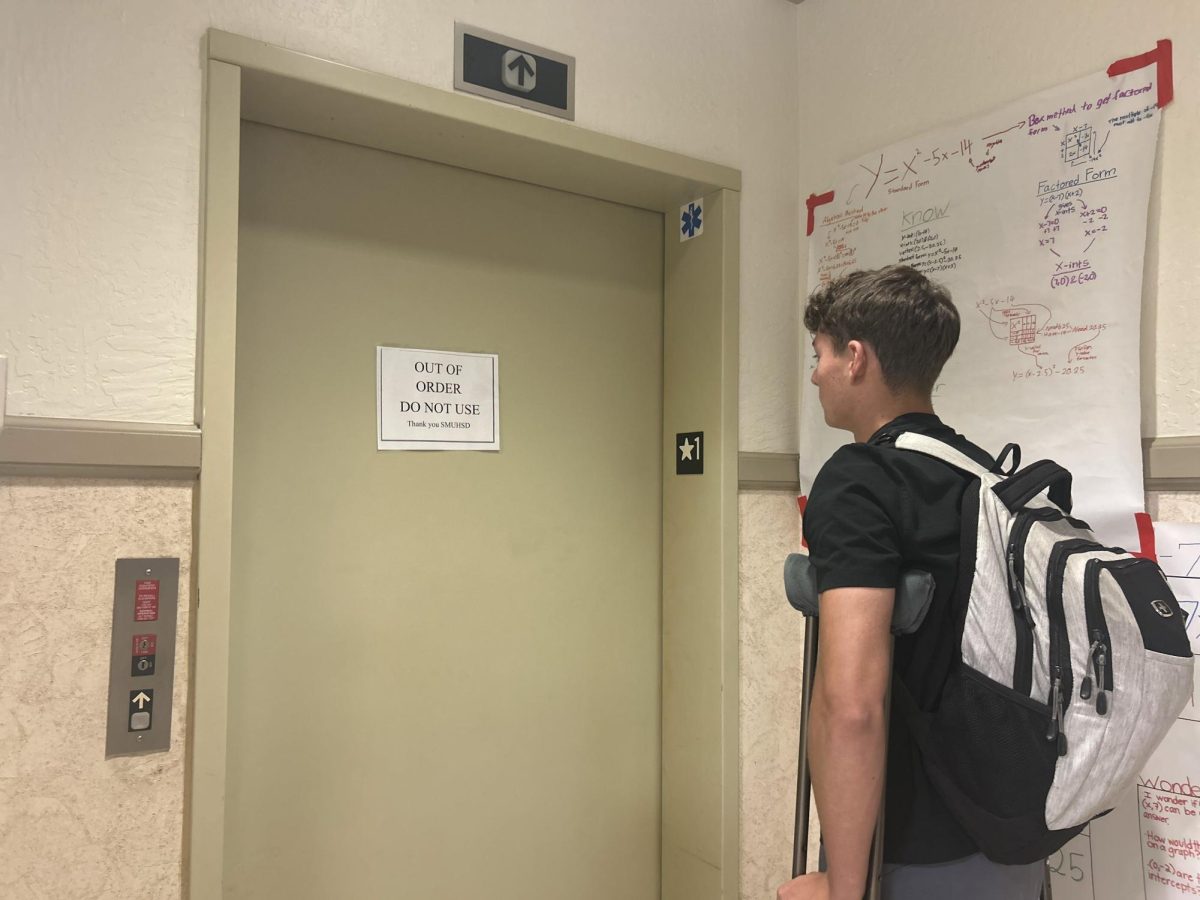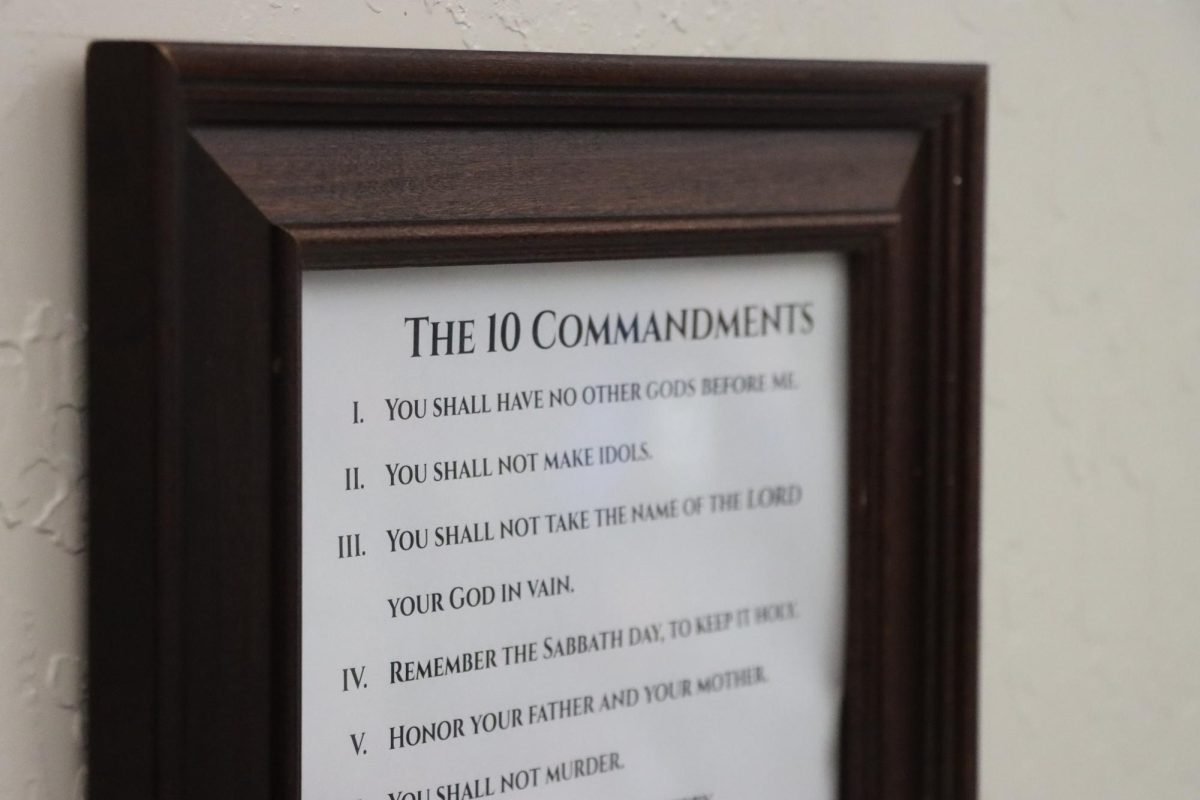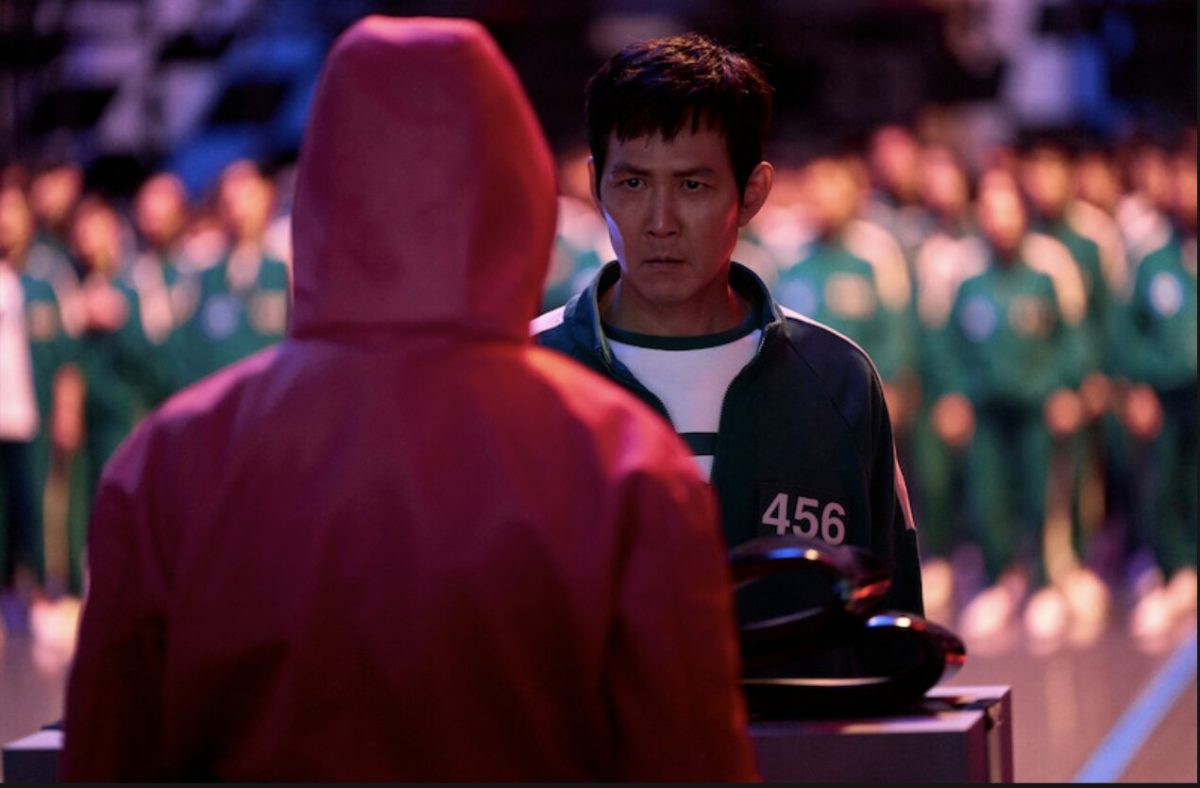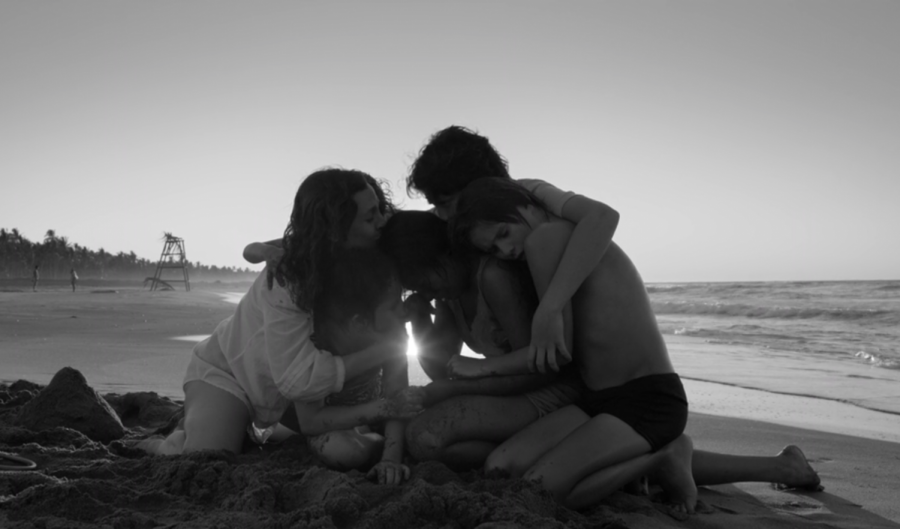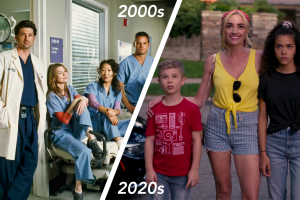A year of firsts: exploring the Best Picture nominees
February 24, 2019
Introduction
The 91st Academy Awards will take place at 5 p.m. on Sunday, Feb. 24 at the Dolby Theatre in Los Angeles, with millions of others watching from their home screens, although not as many as the Academy would like. Last year’s viewership was the lowest yet. On the evening of the show, some nominees will arrive looking as though they just stepped out of a science fiction film, while others will dress like they came from their junior prom. The event remains the cinephile and theater kid equivalent of the Super Bowl, despite the controversy ubiquitous this awards season. The proposed Best Popular Film category was canceled after backlash from people who saw it as elitist and condescending. There is no host, an uncommon decision, since Kevin Hart canceled after his past homophobic comments resurfaced. Even the ceremony itself came under fire, as moves made to shorten the run time marginalized the non-acting categories like Best Original Song and Best Cinematography. Unlike 2018, the Best Picture race has an obvious frontrunner and even clearer losers. While some might say a few of the other nominees have a good chance, I think that unless there is a major upset, “Roma” will take the statuette that “The Shape of Water” won last year.
Bohemian Rhapsody
Where to Watch: iTunes, YouTube, Amazon Prime, select theaters. Note: may be available for purchase only rather than rental on some platforms.
My rating: 3/5
Student average: 4.22/5
This is a movie about Freddie Mercury, not Queen. Anyone expecting the latter will likely leave disappointed. The creators have taken liberties with history and ended up with a decent plot that overlooks the other members of the band. I do not recommend watching this movie if you are a diehard Queen fan (I’m not, but I discovered I know more of their songs than I thought) or expecting an in-depth examination of the band’s formation and development. I do, however, strongly recommend watching this movie for Rami Malek.
Malek is a shining star, and though his transformation is not as physically dramatic as Christian Bale’s in “Vice,” I found his adopted persona and stage presence equally impressive as any other nominee’s. I should note that I have seen Malek in “Night at the Museum” but not “Mr. Robot,” and his portrayal of Freddie Mercury shows that he has a magnificent acting range beyond what I had expected. Watching Mercury transform from a baggage handler at Heathrow to a celebrity with a rocky personal life to a man dying of AIDS but finally at peace, is an incredible experience. Some have criticized “Bohemian Rhapsody” for “glossing over” Mercury’s bisexuality, to which I say, “Did we see the same movie?” Seriously, that was one of the major themes. If Malek doesn’t win Best Actor, I will be indignant.
On to the parts I didn’t absolutely love. There are some weird montages which aren’t appealing design-wise, such as the one listing places the band toured and the one quoting critics’ initially lackluster reactions to the ambitious song “Bohemian Rhapsody,”. The movie ties up in a feel-good way after Queen’s reunion and the 1985 Live Aid concert, and I don’t know that real life was quite that simple. For an otherwise emotionally complex movie, I found the conclusion cathartic but a tad one-note. I also thought that Freddie’s father’s character played into immigrant family stereotypes, and from what I have read, he was more supportive of his son in real life than in the film.
On the other hand, the interactions between the band members besides Freddie Mercury (admittedly side characters) are entertaining, especially Brian May (Gwilym Lee). Apart from Malek, the second-best performance is definitely Lucy Boynton’s as Mary Austin, the love of Freddie Mercury’s life, first his fiancée and later his friend. Interestingly, the real-life Mary Austin is one of the only people who have remained quiet about “Bohemian Rhapsody.” Even so, she and others who knew Mercury OK’d the script, and Malek met with many of them, such as Mercury’s sister, Kashmira.
As someone who heard “Somebody to Love” as the opening track and thought, “It’s the best song from ‘Ella Enchanted!’” (seriously, if you haven’t watched that iconic Anne Hathaway scene, go fix that right now) “Bohemian Rhapsody” has something for everyone. No, it is not an exact depiction of Mercury’s life, and it’s not going to win Best Picture. But Freddie Mercury is one hell of a role, and Malek pulled it off beyond my wildest expectations.
“The acting is incredible. Especially Rami Malek’s action; he completely transformed into Freddie Mercury and it was beautiful to watch … [but] I don’t think they took enough risks with the plot.” -Freshman Cate Cattano
“The dialogue felt flat, and I felt as if I was being catered to. Overall, the performances were less exciting and well done than I assume real Queen concerts were, and I was disappointed by the inaccurate portrayal of Freddie.” -Sophomore Ella Stitzlein
Vice
Where to Watch: Select theaters.
My rating: 3/5
Student average: 3.57/5
I liked “Vice” more than I thought I would. “A movie about Dick Cheney” isn’t the most exciting pitch in the world, but writer, producer and director Adam McKay managed to make Vice a wild ride anyway. At first glance, it is filmed and edited like a low-budget sitcom with sardonic introductions and flashy transitions. The way the narrator—who, by the way, is strangely unrelated to the plot until much later—introduces the characters feels out of place for a biopic I thought would be more serious.
Within the first five minutes, however, I realized this is not the type of movie I assumed it would be. It takes constant jarring turns, like the creators were spinning a roulette wheel to see what bizarre route they’d take next. Some of the more wonderfully weird plot devices include a fake ending partway through the movie complete with rolling credits and cliché biopic wrap-up text, a scene in which Dick Cheney and Co. sit at the table of a fancy restaurant and order Guantanamo Bay and other “legal” ways to torture people from a polite server, and the real ending: a close-up of fishing flies with “America” from “West Side Story” playing ironically in the background. According to “Vice,” Anita should reconsider her chants about how great it is to live in the U.S. of A.
The script felt stilted in the beginning, and I wasn’t sure I liked the narrative style, but once I dropped my expectations off a metaphorical cliff, I enjoyed the distinct style of “Vice.” I should also mention that this movie is made for left-leaning people, something I wasn’t sure would be the case. There is in fact a tongue-in-cheek mid-credits scene calling out the “libtard” bias of the movie.
The oddities of “Vice” are its strongest point, given that Dick Cheney is shockingly not a very charismatic person. On that note, Christian Bale is not the best actor of the season. I understand why he has been nominated, but the fact that he is up there with Rami Malek as a major contender to take home the trophy is crazy—I thought Bradley Cooper would be in that position. The Academy has an obsession with established, white male actors with tons of age makeup à la Gary Oldman in “Darkest Hour.” The makeup is great and will probably win in its own category, but it doesn’t necessarily reflect on Bale’s acting chops.
Amy Adams, on the other hand, is a star as an ambitious and honestly mean housewife who, in a more modern era, probably would have made a better conservative politician than Cheney himself. Steve Carell of “The Office” fame is another major character, but I felt as though he was just playing a slight variation on Michael Scott. I wasn’t that impressed. Sam Rockwell is up for Best Supporting Actor again after winning the same award last year, this time for his hilarious George W. Bush impersonation. His role isn’t substantial enough to get him a win this time around, but his Bush is delightfully fun. I wonder what Cheney and Bush really make of this movie. It doesn’t look great for them.
“All performances are fantastic. It’s really the directing and editing that screws it up.” -Sophomore Ethan Suh
“Super well written and fascinating film. Amy Adams’s role as [Lynne] Cheney was incredible. Hoping it wins best picture because I think it definitely deserves it.” -Sophomore Ella Stitzlein
Green Book
Where to Watch: Select theaters.
My rating: 2/5
Student average: 4.1/5
This is not a terrible movie. The acting was done well enough for the Academy to nominate the two leads, Viggo Mortensen and Mahershala Ali, in the Best Actor and Best Supporting Actor categories, respectively. As movies go, this one is interesting enough. The idea of exploring a drive through the Deep South through the lens of an Italian-American man from the Bronx and a rich black pianist is controversial already. The problem lies in the way this movie hits its audience over the head with its message, which is surprisingly favorable toward the white man who uses racial slurs.
Everything important is said in such obvious ways that I wonder if the movie’s creators have heard of subtlety. They wanted to portray the speculation that the famous pianist Don Shirley was gay, so they had his driver find him in trouble with the police for picking a white man up at the YMCA. They wanted to talk about how Shirley felt out of place in every situation because of his dual identities, so he had an admirably acted but terribly cliché monologue spelling it out. They wanted to stress that both Shirley and his driver Tony had lessons to learn from each other, so they had Shirley loosen up and Tony become less racist. As if the former is as awful of an offense as the latter. Call me a cynic, but I can’t believe that after being openly hostile toward black workers at the beginning of the movie, Tony just stood up for Shirley in front of his family, and they all had a happy Christmas dinner together by the end.
Mortensen and Ali do the best with what they were given. Mortensen, a 60-year-old Danish actor, is a somewhat funny pick for an Italian-American family man, but it works. Ali could very likely win Best Supporting Actor for the second time in three years. Mortensen, who drew controversy for using the N-word while speaking about the movie, will not experience the same level of success. It’s interesting to note that Nick Vallelonga, Tony’s real-life son, is a producer and writer of “Green Book;” this could explain the overall favorable look on Tony’s growth.
This movie committed no crimes, but its idea of race relations is poorly executed. If the Academy wanted to nominate a movie about racism of the past century, why on Earth did they pick this one over “If Beale Street Could Talk?”
“Although it is fairly idealistic take on racism and is basically ‘Driving Miss Daisy’ reverse situation, it is a really good movie with great actors and a fantastic soundtrack.” -Senior Lilli Hirth
“It provides absolutely no commentary on race except ‘racism is bad’ … It would be so much better if only it was written from Mahershala Ali’s character’s perspective.” -Sophomore Ethan Suh
Roma
Where to Watch: Netflix, select theaters.
My rating: 5/5
Student average: 3.83/5
“Roma” is my favorite movie of the year. It is loud in a quiet way. It does not hesitate to pause for meaningful, prolonged moments, and take time in making its point. Its point is remarkable, too—an ode to what it is to be a woman, a mother and alone. The main character, Cleo Gutiérrez (Yalitza Aparicio), is the housekeeper for a wealthy Mexico City family who finds herself pregnant by the man who abandoned her. The father of the family has also left, and Cleo has a strong bond with his wife, Sofía (Marina de Tavira). Despite their shared struggles, Cleo is poorer, indigenous and has little recourse in the fancier sphere in which she lives but does not belong to. The characters’ personal lives are intertwined with the backdrop of 1970s Mexican political instability.
I love the use of background noise, which emphasizes the idea of being alone in a crowd. Even when dialogue is sparse, the actors’ faces portray their understandable trains of thought, especially those of Cleo. The visuals are also wonderful, one of two black and white films up for Best Cinematography this year (the other being the Polish “Cold War”). Aparicio is truly remarkable, “Roma” being the early childhood educator’s first acting job. I hope she will continue in the field. She is also the first indigenous woman to receive a Best Actress nomination, while her costar Marina de Tavira has more experience and is up for Best Supporting Actress, a relative surprise. Neither is likely to win, but they are both incredibly deserving of the recognition.
The movie itself, on the other hand, is a definite frontrunner for Best Picture and the first Netflix release to experience Academy success. With haunting dialogue like “siempre estamos solas” (“we [the women] are always alone”) and “yo no quería que naciera” (“I didn’t want her to be born”), the screenplay, the acting and the images are flawless. This is a Spanish-language movie which I watched in its original tongue, but my mother watched it with English subtitles and still thoroughly enjoyed it, as well. Even though “Roma” has many quiet moments, its dialogue is some of the most unforgettable of the year.
One of the film’s strongest suits is its direction. Alfonso Cuarón is not only the director—this is his movie, based on his childhood, with his own writing, camera work, editing and role as producer. For a foreign director thoroughly entrenched in the American mainstream with works such as “Harry Potter and the Prisoner of Azkaban,” “Roma” is as personal as filmmaking can get. In that regard, it’s this year’s “Lady Bird.” While Cuarón already won Best Director for “Gravity” in 2014, he is sure to win it again. “Roma” is my favored hope for Best Picture.
“A modern day masterpiece, just behind ‘The Favourite’ for me. Cuarón has crafted such a beautiful story with such complex and layered characters. The sets are spectacular and the sound editing is amazing.” -Sophomore Ethan Suh
“If you enjoy cinematography, this movie is for you. If not, it can get very slow.” -Senior Lilli Hirth
The Favourite
Where to Watch: iTunes, YouTube, Amazon Prime, select theaters. Note: available for purchase only.
My rating: 4/5
Student average: 3.5/5
For a Restoration period piece about lesbian power dynamics, “The Favourite” is surprisingly history-based, if largely speculative. Queen Anne (Olivia Colman) and her lover-slash-political adviser, Sarah Churchill (Rachel Weisz), are living comfortably in a stunningly beautiful palace. Enter Sarah’s disgraced cousin Abigail (Emma Stone with an English accent), who seduces the queen with her flattery while secretly engaging in political bribery with the hilarious Earl of Oxford (Nicholas Hoult).
“The Favourite” is a movie that thrives on making its audience somewhat uncomfortable at all times—never mind its constant sexuality. From Abigail almost squashing Anne’s beloved rabbit, named after her dead child, to an excessively long montage of a naked man getting pelted with tomatoes, this movie does not care what the audience wants to see, but what the viewer does see is a delight. The cinematography is remarkable, as the camera pans over the scenes using a distinctive fish-eye lens that grabs the viewer’s attention, and the colors in the castle and the forest are as vibrant as all get out. I would give half of my right arm to live in that palace. The script is also distinctive. The characters speak anachronistically, talking about sex with swear words I’m certain they would not have used in the 18th century.
This movie is strangely funny, and Colman and Weisz give fantastic performances. I particularly admire Weisz’s acting because her character loves the queen but doesn’t hesitate to tell her that she looks like a badger with makeup on; she loves the queen but makes her angry enough to marry Abigail to a baron and sabotage Sarah’s political plans while the latter is near-dead in a brothel. Stone and Hoult are also great actors, but it is much easier to play a purely vindictive role.
Colman, Weisz and Stone have all garnered acting nominations, the former for Best Actress and the other two in the supporting category. The movie is up for ten awards overall, the most of any this year other than “Roma,” which has the same number. I didn’t adore this movie—though I certainly appreciated it more than my seventh-grade sister did—but it deserves its nominations.
“Who doesn’t love a lesbian love triangle? A new spin on the period drama genre.” -Senior Lily Page
“Emma Stone.” -Senior Justin Lo
BlacKkKlansman
Where to Watch: iTunes, YouTube, Amazon Prime, (very few) select theaters.
My rating: 5/5
Student average: 4.35/5
“BlackKkKlansman” is not messing around. It will make you sad, angry, repulsed, hopeful and scared and then leave you wondering how much society has really changed. It is a bold and unlikely story of two Colorado Springs police officers, one black and one Jewish, who work together in the 1970s to infiltrate the Ku Klux Klan (KKK) and thwart its plans to bomb a civil rights rally put on by Colorado College’s black student union.
The racial abuse in this movie is hard to watch and, I’d imagine, even harder to act. The juxtaposition of the Black Power movement and the KKK is precarious—the two groups are shown chanting in successive shots mirroring each other—but it is a cool artistic move. The movie’s editing is praiseworthy in general, and the music is memorable. One particular instrumental track repeats itself throughout for dramatic effect, and I can still hear its beat. The most unforgettable part of the movie, however, is its ending. After a topical but certainly retro plot, extensive footage of the Charlottesville rally and other modern acts of white supremacy are played as the final blow. The ending drove the story home and brought its message about racism into the contemporary center stage of the movie. The recent video clips are so different in style from the rest of the film but also the same. It’s unrelenting.
The two main actors, John David Washington and Adam Driver, are stunning foils of one another; Washington’s Ron Stallworth is caught between subtle resistance from within the police force and his girlfriend’s radicalism, while Driver’s Flip Zimmerman gets a more theatrical role as he pretends to be the white Ron Stallworth in person and explores his own racial and religious identity in private. Unfortunately, only Driver is up for an award out of the two (Best Supporting Actor). He deserves to win, but Washington should have at least been nominated. Spike Lee, an iconic director, is also nominated in his category for the first time. Despite this, he will almost certainly lose out to “Roma’s” Alfonso Cuarón. “BlacKkKlansman” is nominated for six awards, but it deserves more Academy recognition than it will likely end up receiving.
“Really hard to watch because of the language and violence, but it was very captivating and important to watch. It exposes the truth about the times.” -Junior Sophie Aziza
“Washington’s performance as Stallworth was really entertaining, and Adam Driver’s ability to play his sidekick in the movie shows Driver’s acting flexibility and talent.” -Senior Ernest Law
Black Panther
Where to Watch: Netflix, iTunes, YouTube, Amazon Prime, (very few) select theaters.
My rating: 3/5
Student average: 4.06/5
Almost everyone has seen “Black Panther,” and if they haven’t, they might be living under a rock. I am not a big superhero action movie fan. My friends will scoff at me for mixing up Marvel and DC, and my viewing history is limited to “Wonder Woman” and the 2002 version of “Spider-Man” that scared me as a young child on a ski trip. Even so, “Black Panther” has broken numerous box-office records and appealed to even the most Marvel-ignorant of us.
I attribute most of the movie’s quality to its villain, Erik Killmonger (Michael B. Jordan). His incredible depth far surpasses that of his adversary, the newly crowned King T’Challa of Wakanda (Chadwick Boseman), a fictional African country wealthy in vibranium and technological advances. T’Challa is a more traditional hero; he goes from an isolationist ruler who worships his father to a more involved and nuanced world leader, but his struggle is not as interesting as Killmonger’s. The latter is angry with Wakandan leadership for cruelly abandoning him as a child in Oakland and turning a blind eye to the global suffering of black people. To me, his bitterness makes sense. His motives are compelling and compassionate in a way we don’t usually see in antagonists, and yet he is also a hate-filled man who wants to start a violent revolution across the world. Toward the end of the movie, he shouts at T’Challa, “The world took everything away from me!” In this moment, I saw all of the vulnerability and childhood trauma that led to this climax, and it was more clear than anything else in the film so far. Killmonger’s death scene is also heartbreaking. The line “Just bury me in the ocean with my ancestors that jumped from the ships because they knew death was better than bondage” is one of the biggest gut punches this year.
The computer-generated imagery (CGI) is not great. Maybe it is a product of its time. However, the costumes are beautiful, combining elements from various African cultures with shocking attention to detail. The music is also noteworthy, and Kendrick Lamar and SZA’s “All the Stars,” which plays as the credits roll, is nominated for Best Original Song. As for the acting, I loved Boseman’s and Jordan’s as well as that of Letitia Wright, who played T’Challa’s spunky younger sister, Shuri. My one complaint in this category is that I do not agree with the casting of Martin Freeman, to me a quintessentially British actor, as a tough, American CIA agent. He felt out of place in what was altogether an even movie.
I don’t think “Black Panther” will win Best Picture. After the controversy involving the patronizing Best Popular Film category, which many were calling the “‘Black Panther’ Award,” the Academy had to redeem itself during its nomination process. I do not foresee the voters looking most favorably on a superhero movie, but the film has a good chance in the musical and production-related categories.
“The villain had a relatable motive, and [the] plot was well-written. However, the CGI was not great, and more attention should’ve been given to the women like Okoye and Nakia.” -Sophomore Laurie Tang
“Honestly one of the blandest Marvel movies in years … Just watch ‘Spider-Man: Homecoming,’ or ‘Thor: Ragnarok,’ or ‘Avengers: Infinity War;’ those movies have more personality and feeling than ‘Black Panther’ will ever have.” -Freshman Aidan Hay
A Star Is Born
Where to Watch: iTunes, YouTube, (very few) select theaters.
My rating: 3/5
Student average: 4.42/5
I am prejudiced against A Star Is Born, and that’s why I only allowed it three stars. I would say I’m sorry, but that would be a lie. I don’t feel bad about my view. A Star Is Born, as a fourth-time remake of a classic story and a Hollywood crowd pleaser, feels too safe. Who decided we needed another version, anyway?
I’m not complaining though. I had fun watching this movie, which is a chronicle of aspiring singer-songwriter Ally’s (Lady Gaga) tumultuous romance with alcoholic celebrity Jackson Maine (Bradley Cooper). Gaga and Cooper hit all the right notes, with “Shallow” being the big showstopper, and the ending is both tragic and inspiring. The leads have been nominated for Best Actress and Best Actor, respectively, and for good reason. Lady Gaga can act, and Bradley Cooper can sing. In fact, I think Lady Gaga’s performance was stronger even than Cooper’s as a grieving lover. She gives off a strong atmosphere of hope that I admire.
It’s just that so many of the other movies nominated are bringing important issues to the table. “Roma” stars an indigenous woman and is one of the most successful foreign-language films at the Oscars ever. “BlacKkKlansman” exposes the similarities between the white supremacy of the 1970s and that of today. “Black Panther” is a huge win for superhero movies and the black community, “Bohemian Rhapsody’s” exploration of sexuality is perhaps not new but extremely necessary, and “The Favourite” is so markedly different from the style of any other movie, as is “Vice.” “A Star is Born” is good, but I cannot bring myself to get excited about it.
That being said, it has few tangible weaknesses. I didn’t love Gaga’s rendition of “La Vie en Rose,” one of my favorite songs. At times I wondered why Anthony Ramos was there as Ally’s best friend since he conveniently disappeared when the plot with Jackson was busy, but I love Ramos and can’t say I feel strongly that his performance was out-of-place. Overall, if you love this movie, I get it. It’s well-done, and I hope “Shallow” wins Best Original Song. I just hope that “A Star Is Born” doesn’t win Best Picture.
“I got so wrapped up in the story line. Both of their voices were so good, and the soundtrack was addictive. I also didn’t know what the ending of the movie was going to be (even though it’s a remake), so it broke my heart, and I couldn’t stop crying.” -Senior Clodagh Ryan
“Very powerful movie with [a] great soundtrack and tie-in to mental diseases.” -Freshman Ella Bradley
Summary
Should Win (Student Opinion): “Bohemian Rhapsody.”
Will Win (Student Opinion): A tie between “Black Panther” and “Bohemian Rhapsody.”
Should Win: “Roma.”
Will Win: “Roma.”



